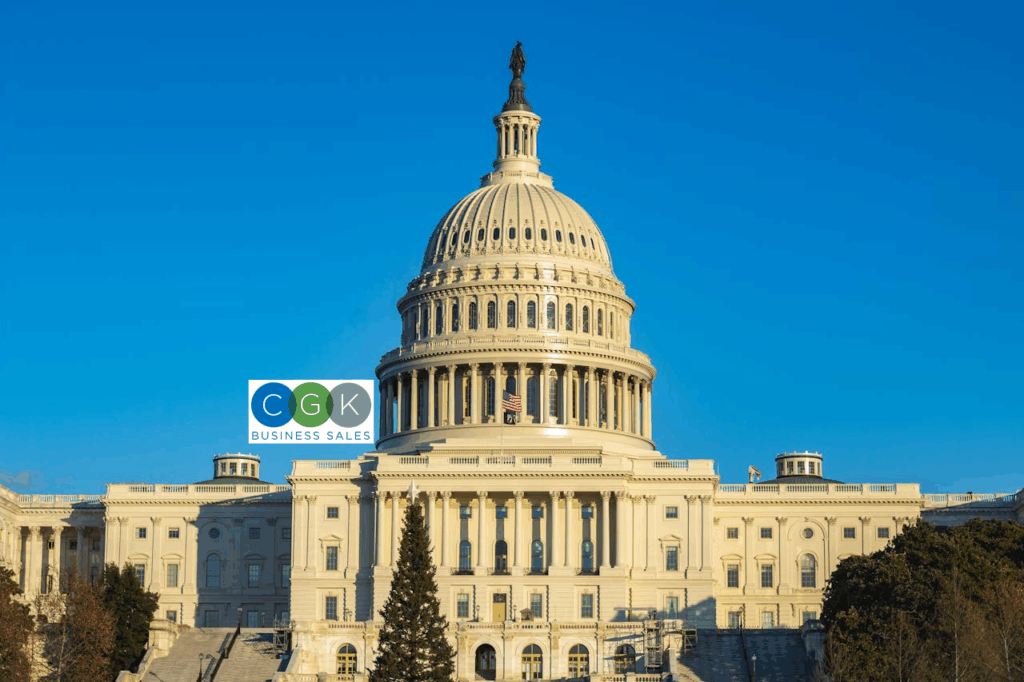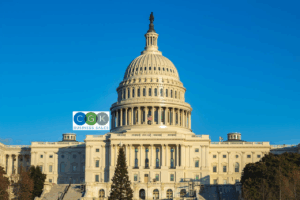Federal funding gaps, agency furloughs, and delays in government services may seem distant from your day-to-day operations. But when you are preparing to sell your business, the ripple effects of a government shutdown can meaningfully impact financing, buyer confidence, contract timing, and ultimately your valuation. Understanding these effects now gives you the strategic edge.
What the Shutdown Means for Deal Making
When the federal government shuts down, its impact reaches far beyond Washington. For business owners, especially in the small and lower-middle-market space, this kind of event introduces new timing risks and process complications. The first major ramification is the disruption in government-backed financing and contracting. Without access to those channels, buyers may become more cautious, deals may stall, and valuations may shrink.
For companies that rely on government contracts, or on buyers who will use federal-guaranteed loans, the shutdown creates uncertainty. If a buyer expected to use a government loan guarantee or was counting on new federal procurement, that path may now be delayed or closed. The effect is that the government shutdown business sale ramification is not only about paused services; it’s about how buyer capacity and seller risk perceptions change.
SBA Loan Delays and Financing Bottlenecks
One of the clearest and most immediate problems for sellers comes through the Small Business Administration. During a shutdown the SBA stops processing new 7(a) and 504 loans, halts issuance of new loan numbers, and freezes many of the adjustments on existing applications. For a business owner preparing to sell, this disruption can have several serious consequences.
First, it delays or removes a common financing path for buyers. Smaller business acquisitions often rely on SBA-backed loans to make the math work. If that channel is blocked, some buyers might walk away or offer less. Second, the inability to assign loan numbers or obtain approval freezes the buyer’s timeline, which could push the closing date out or trigger renegotiation. According to the SBA’s own analysis, each business day of shutdown translates into hundreds of millions of dollars of blocked loan capital.
For sellers, the key takeaway is this: when you hear about the shutdown you should assume financing risk rises. That means you need to be ready with alternate financing options, ensure your buyer is qualified without counting strictly on the SBA path, and expect that if buyers wait they may demand more favorable terms. The government shutdown business sale ramification here is that your deal may cost more or deliver less unless you account for the financing uncertainty.
Regulatory and Contractual Approvals Stalled
Beyond financing, another major part of the government shutdown business sale ramification is the delay in federal regulatory, licencing, and procurement functions. Many small and lower-middle-market businesses hold contracts with government agencies or depend on regulatory approvals for operations, growth plans or transfers of licensing which can be critical to a buyer’s assessment of risk.
When a shutdown occurs, agencies that issue licenses, inspect facilities, renew permits, or approve contracts may operate on limited capacity or pause entirely. Buyers factoring in those dependencies may elect to delay offers, reduce their bid, or include protective conditions. Moreover, a seller whose financial projection depends on a renewed federal contract or licence may find that the timing of closing is extended, or terms are renegotiated.
In short, when you are entering market during or right after a shutdown you must highlight and mitigate these dependencies. For sellers, this means identifying any regulatory or federal contract risks ahead of time, quantifying the impact of delay, and communicating clearly to buyers. Missing these steps makes the government shutdown business sale ramification far more costly.
Buyer Confidence and Valuation Risk
Even when your business is solid, the broader environment affects how buyers view risk and value. The concept of government shutdown business sale ramification takes on major importance here because a shutdown signals elevated macro risk. Buyers may respond by compressing multiples, increasing escrow amounts, or holding back cash at closing.
In a normal environment a buyer might bid based on growth projection and cash flow, but during a shutdown they may instead act more conservatively. Some may walk away rather than take on extended risk. In effect, the seller sees fewer offers, weaker terms, and potentially a lower purchase price. According to a report by the U.S. Chamber of Commerce, small business loan disruptions and contract delays during a shutdown can translate into lost financing and reduced hiring, which ripple into valuation.
For owners considering a sale, now is the time to assume that valuations will shift unless you position your business with certainty. Be ready to justify your assumptions without relying on federal channels for growth, be proactive in showing alternative growth paths, and be mindful that the government shutdown business sale ramification can mean longer timelines and more negotiated risk.
What Sellers Should Do Now to Protect Value
While the macro environment can’t be controlled, preparation always can. During any extended government shutdown, the most effective way to protect business value is to take proactive steps that strengthen buyer confidence and financing flexibility.
Start with documentation. Sellers should update and organize all financial records, including monthly statements, tax filings, and any contracts that could affect recurring revenue. Buyers lose interest quickly when documents are incomplete or inconsistent. Having everything ready makes it easier to keep momentum once agencies reopen or financing resumes.
Next, review financing alternatives. Not every buyer depends on the SBA, but if your deal structure assumes that path, consider working with lenders who can operate without federal guarantees. Private banks, credit unions, and alternative debt providers may still close loans during a shutdown, though their underwriting standards may differ.
Finally, stay visible. Many sellers freeze their marketing efforts during uncertain periods, but that can backfire. When others step back, staying active helps maintain buyer interest. If your business is well positioned and professionally represented, buyers will remember that once the market normalizes. The sellers who stay ready tend to move fastest when the government reopens.
How the Shutdown Could Create Opportunity for Prepared Sellers
Disruption always creates winners and losers, and the same applies in mergers and acquisitions. While some buyers pause during a shutdown, prepared sellers can benefit from reduced competition once activity resumes.
Many buyers still have capital to deploy and are eager to close deals when conditions stabilize. A seller who has their documentation, valuation analysis, and process in place can move quickly once those buyers reengage. In fact, these transitions often lead to a brief “surge window,” when pent-up demand creates a wave of closings.
Another hidden advantage is buyer selectivity. Because shutdowns filter out less-serious buyers who rely on slower government programs, the remaining buyers tend to be better qualified and more decisive. When your business is ready to present, those buyers are more likely to move forward confidently.
For sellers who plan to go to market soon, this is the time to refine materials, clean up financials, and engage a professional advisor. The government shutdown business sale ramification doesn’t have to be negative if you treat it as an opportunity to prepare and position yourself for the next wave of activity.
How CGK Business Sales Helps During Uncertain Times
CGK Business Sales works with owners every day who face unpredictable market conditions, whether from rising interest rates, financing constraints, or events like the current government shutdown. The firm’s approach emphasizes readiness, positioning, and structured competition among buyers, which helps mitigate external risks.
CGK’s advisors begin by reviewing your company’s financial and operational readiness, identifying where federal dependencies may exist, and building contingency strategies around them. For sellers who might otherwise rely on SBA buyers, CGK helps broaden the buyer pool to include private equity groups, strategic acquirers, and qualified individuals who use private financing.
Beyond that, CGK manages communication to ensure deals don’t lose momentum. Even when certain financing channels are paused, other elements of the sale process — due diligence, marketing, valuation review — can continue. This way, when conditions improve, the business is ready to close quickly.
For small and lower-middle-market owners, the key is not to wait passively for uncertainty to clear. Working with experienced advisors ensures that you maintain control of timing and buyer perception, even when external events disrupt the broader environment.
Looking Ahead: Timing Your Exit With Confidence
Every cycle of disruption eventually passes, but the sellers who prepare early always capture the best outcomes when markets reopen. The government shutdown business sale ramification underscores a larger truth — timing and readiness determine success.
The current pause in SBA lending and regulatory activity may slow deals temporarily, but it also presents a valuable moment to refine your presentation and engage the right partners. Sellers who use this period to strengthen their position, clarify value, and diversify buyer outreach will be the first to benefit once normal operations resume.
If you are considering selling and want to understand how timing, competition, and preparation can protect your deal from outside uncertainty, learn more about how to sell your business successfully on our website.
A government shutdown can stall financing or create anxiety in the market, but it doesn’t have to halt your exit goals. With proper planning, disciplined guidance, and a professional process, business owners can still achieve strong results, even in uncertain times.


